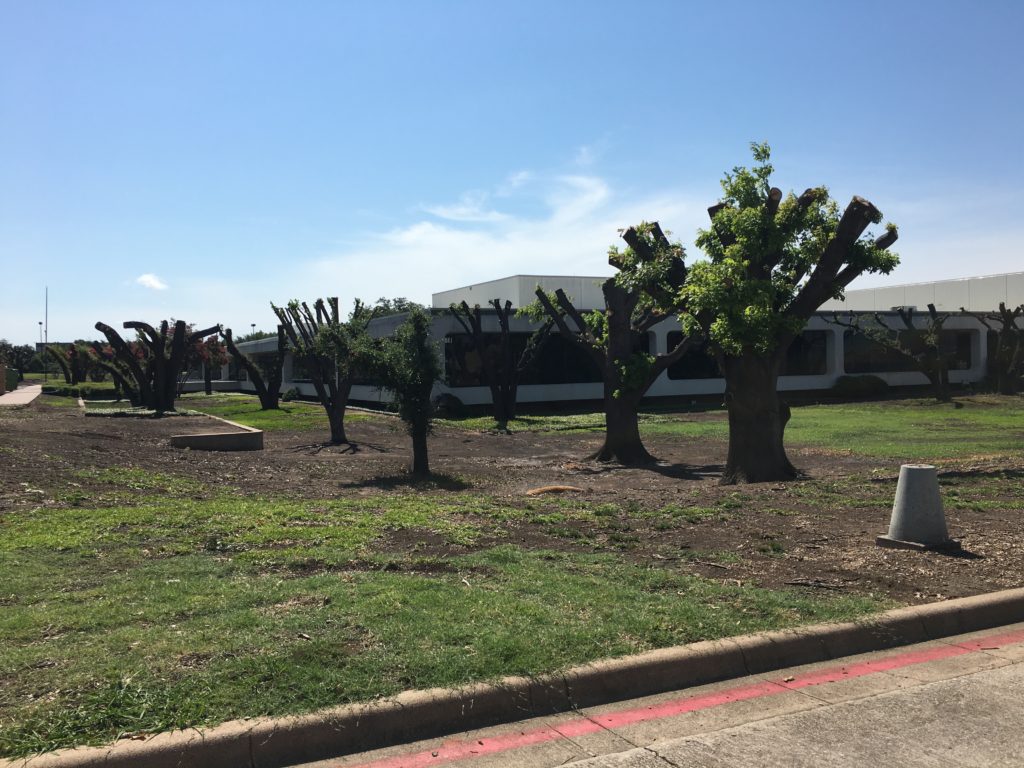Abbott’s Attempt to Thwart Local Control Over Tree Ordinances “Stumps” Voters
UPDATE – The Senate Business & Commerce Committee will meet at 9:00 AM, Saturday, July 22, 2017 in the Texas capitol hearing room E1.016 to hear testimony on SB 14 by Hall – relating to a property owner’s right to remove a tree or vegetation. If you are in Austin this weekend, considering stopping by the capitol and testifying or even just registering your position against this bill at one of the House registration kiosks in the capitol extension. (do this before the hearing starts at 9:00 AM to make sure your position is documented.
Contributed by Citizen Rita

This week marks the start of the Special Session at the Texas Legislature. Governor Abbott has put forward a wish list of twenty agenda items including a bill that would prevent cities from regulating what property owners can do with trees on private land.
Already during the 85th legislative session, bills attempted to take an axe to local control and city tree ordinances including one by Representative Workman (HB 1572) who devised a bill to allow trees to be cut down if the owner felt a tree(s) posed a “fire risk.” Other bills such as one by Senator Kolkhorst (SB 744), would have given developers more latitude in a city that imposes a tree mitigation fee by allowing developers to apply for a credit if they plant trees elsewhere, instead of paying the mitigation fee. Both bills failed to become law, though Kolkhorst’s bill made it all the way to the finish line, only to be vetoed in the end by Governor Abbott.
Perhaps the Governor’s veto pen was triggered with an aspiration to deal trees a more fatal blow with a sweeping bill in the Special Session to take total local control away on all city tree ordinances across the state. Abbott has tapped Senator Bob Hall of Rockwall, who unsuccessfully tried to take away cities ability to have bag bans, as his champion to carry the tree ordinance ban in the Senate (SB 14). In the House, Abbott recruited Representative Workman, the author of the failed tree fire risk bill, and whose roots (pardon the pun) are in the construction business, to head up the efforts (HB 70).
There are more than 50 cities in Texas with ordinances that protect trees on private property that would be affected if this proposed legislation passed.
Thwarting the preservation of mature trees is not only short-sighted but also short changes the value of a property. Numerous national surveys including one by the University of Washington show that towering trees increase the value of a property by 7 to 19 percent.
According to the U.S. Department of Agriculture, one healthy tree next to one’s home can provide the cooling effect of ten air conditioners operating 20 hours a day. According to the USDA Forest Service, trees properly placed around a building can reduce air conditioning costs by as much as 30% and can save between 20 to 50% of the energy used in heating.
Trees help our urban climate in many ways. They keep cities cooler and reduce air pollution, as less fossil fuel is needed to generate electricity to air condition buildings. Trees also help clean the air by taking in carbon dioxide and releasing oxygen. Additionally, trees contribute to improving the health of our local communities by collecting and hold dust pollution.
Management Information Services has estimated that the average value of the 60 million plus street trees in this country have an average value of $525.00 per tree.
So what’s not to like about trees, especially beautiful mature ones?
Well, critics speculate that Governor Abbott wants this bill partially out a personal vendetta against the City of Austin which told him that he couldn’t chop down a pecan tree in his backyard without replacing it or paying into the reforestation fund. It’s also been said that the Governor thinks protecting trees is a “socialist” view and that it “violates private property rights.”
Tell Governor Abbott he needs to see the forest through the trees and realize the “green” in “green.” Abbott shouldn’t use a personal incident to destroy the value that the rest of us see and realize on our properties by taking away the power of local municipalities to pass and execute their tree ordinances.